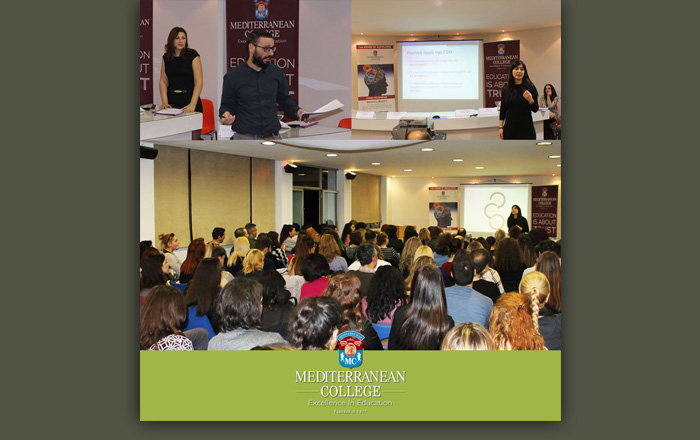The School of Psychology of Mediterranean College organised on Wednesday 8 February a very successful – in terms of turnout – workshop titled: “ One case – Three psychotherapists: Choosing the appropriate psychotherapeutic approach.”
Speakers of this event were:
- Mrs Elena Poulopoulou, Psychologist, Existential and Systemic – Family Psychotherapist, who analysed the case by using the person-centred approach
- Dr Eleni Loupou, Clinical Psychologist – Child Psychologist, Psychodynamic Psychotherapist, who analysed the case by using the Psychodynamic approach
- Mrs Konstantina Mylona, Psychologist, Cognitive-Behavioural Psychotherapist, who analysed the case by using the CBT approach.
The coordinator of this workshop was Mr George Thomas, Psychologist.
This event aimed to present three psychotherapeutic approaches and how these can be applied on treatment, by using the case study of “Orestis”.
At first, Mrs Poulopoulou presented the person-centred approach, starting with its core theories, and then she applied it on this case study, in the form of specific therapeutic relationships, based on the details that were given for “Orestis”. Finally, Mrs Poulopoulou analysed the therapeutic rationale of the approach, by presenting a specific design and the technical means (such as open-ended questions, reflex skills, paraphrasing, summarizing and positive reframing) and leading to a prognosis for Orestis.
Then, Dr Loupou presented the psychodynamic approach, starting with its core theories, such as the unconscious, the transaction, the Self and the defense mechanisms. Taking into account the milestones in Orestis’ life, she displayed the psychotherapy’s aims, the technical means as well as the primary and secondary strategies of the approach, highlighting that the therapeutic attributes of each client affect the therapeutic strategies to be employed and, thus, one cannot use a single therapeutic approach that fits all.
Mrs Mylona presented the third psychotherapeutic approach, the Cognitive-Beahavioural one, focusing at first on its basic elements, techniques and thinking levels (core beliefs, intermediate beliefs, automatic thoughts) and how those influence feelings and behaviour. She continued by discussing Orestis’ core beliefs, the aspects of the incident that require further examination and she analysed the evolution of his problematic behavior, ending to an indicative therapeutic plan.
After the presentation of the three therapeutic approaches, the event’s coordinator Mr Thomas, made a synopsis concluding that, there isn’t a single, “best” approach, as each one of them deals with the case by using specific therapeutic assumptions and therapeutic design, using its core principles and techniques.
In the end there was a Q&A session and discussion among the attendees, the coordinator and the presenters around “Orestis” and the application of the specific therapeutic approaches.

